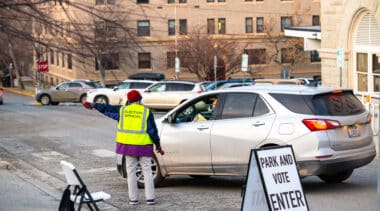Vittorio Nastasi is the director of criminal justice policy at Reason Foundation, where he provides research and technical assistance to lawmakers and stakeholders across the country.
His work focuses on removing barriers to employment, housing, and education for individuals with criminal records; curbing excessive criminal fines and fees; and reducing system overreach through policy research and legislative engagement. His research and commentary have appeared in The Wall Street Journal, Orange County Register, Atlanta Journal–Constitution, Palm Beach Post, and Tallahassee Democrat, among others.
Before joining Reason, he worked with the James Madison Institute and the DeVoe L. Moore Center, researching land-use regulation, occupational licensing, and criminal justice policy. Nastasi holds bachelor’s degrees in economics and political science and is currently a doctoral candidate at Florida State University’s Askew School of Public Administration and Policy. He is based in Tallahassee, Florida.
-
Local governments collected $9 billion in fines and fees in 2020
Local governments in three states—New York ($1.4 billion), California ($1.26 billion), and Texas ($1.17 billion)—collected well over a third of the nation's $9 billion in fines and fees in 2020.
-
Fines and fees: Consequences and opportunities for reform
The use of fines and fees to directly fund courts, law enforcement agencies, or other government activities can result in undesirable conflicts of interest.
-
Innovators in Action: James Small, public safety director of Palmyra, Wisconsin
In the time Small has served in this role, the property crime rate has plummeted by 88% to just over five property crimes per 1,000 residents.
-
Florida must stop relying on taxation by citation
No program or agency should be specifically funded by fines and fees revenue.
-
As inflation rises, incarcerated people are paid less than 63 cents per hour for labor
Commissary prices may rise with inflation, but the wages paid to prisoners are rarely increased.
-
Properly designed impact fees could help Wakulla County accommodate population growth
Impact fees can effectively offset the need to raise additional revenue from other fees and taxes, such as property taxes.
-
How text messages could help California reduce parole and probation violations
Text message reminders for parole and probation meetings are an easy and inexpensive way to help people stay on track and reduce recidivism.
-
How text message reminders can help reduce technical parole and probation violations
This report's findings suggest that sending text message reminders for scheduled appointments could reduce canceled and missed parole and probation appointments by as much as 21% and 29%, respectively.
-
The SAFE-T Act’s impact on cash bail in Illinois
There is ample evidence that even short periods of pretrial detention can result in lost employment, severed social ties, a greater risk of conviction, and an increased likelihood of future criminal involvement.
-
Occupational licensing undermines some of the value of technological innovation
The share of U.S. workers required to hold an occupational license has exploded from around 5% in 1950 to 25% in 2020.
-
Abolishing Oklahoma’s death penalty would be good for justice and for taxpayers
Since 1981, 10 people in Oklahoma have been exonerated while on death row awaiting execution.
-
Ohio Issue 1 (2022): Determining bail amounts based on public safety
Would reinstates requirement that Ohio courts consider public safety as well as risk of non-appearance when setting bail.
-
Abolishing Ohio’s death penalty would be good for justice and for taxpayers
Since 1979, 11 people in Ohio have been exonerated while on death row awaiting execution.
-
Nevada Question 3 (2022): Top-five ranked choice voting initiative
Under rank-choice voting, voters rank their preferred candidates rather than selecting one candidate to receive their votes.
-
Montana C-48 (2022): Search warrant for electronic data amendment
Montana’s C-48 would "make it explicitly clear that our digital information is protected from unreasonable government searches and seizures."
-
Regulations keep homeownership out of reach for young Americans
Housing policy reforms are urgently needed to place homeownership back within the reach of younger adults.
-
Florida Gov. DeSantis continues to pursue Everglades restoration
Florida lawmakers have taken significant steps to advance restoration goals and speed up various projects that have been in progress for nearly two decades.
-
Land-use regulations drive up the cost of housing and hamper economic mobility
Excessive regulations are needlessly inflating housing prices and hurting workers and families.


















